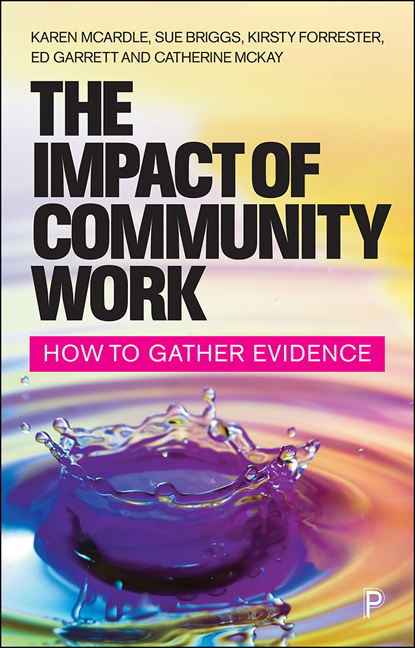3 - A Challenging Context in which Values Matter
Published online by Cambridge University Press: 10 March 2021
Summary
Introduction
As professionals, not only do we work in complex and sometimes demanding community roles but also sometimes in challenging contexts in which we seek to generate evidence of impact. These challenges come from a range of sources and require us to have a means of dealing with them. This chapter introduces the social context in which many of us work and considers the means of dealing with challenges. We consider in this chapter the different kinds of knowing that we can use in gathering evidence, the ways in which values underpin this knowing and the impact of this on the evidence we present to others. The power of knowledge is discussed in different domains alongside its importance in the process of gathering evidence.
Challenges in the social professions
For each of us, the social context will be different and will depend on the culture of our country, our location in that country, the culture of our organisation or profession, and the experiences we have of our team or colleagues and of our supervisor or manager. It will also depend on the character and history of our participants. There are, however, arguably a range of factors that influence our experience of work that are common across social professions. It is important here to introduce the notion of history, and the idea that it lingers with us longer than we necessarily need it and it is imbued in all of us. Much is written about history and how it affects individuals. Arguably, the most commonly referenced ideas are those of Pierre Bourdieu (1977 [1972]), who used the term ‘habitus’ to refer to ‘second nature’. Bourdieu describes how the unconscious operates in the following way:
The ‘unconscious’ is never anything other than the forgetting of history, which history itself produces by incorporating the objective structures it produces in the second natures of ‘habitus’ … in each of us in varying proportions there is part of yesterday's man [sic]; it is yesterday's man who inevitably predominates in us, since the present amounts to little compared with the long past in the course of which we were formed and from which we result. Yet we do not sense this man of the past, because he is inveterate in us; he makes up the unconscious part of ourselves.
- Type
- Chapter
- Information
- The Impact of Community WorkHow to Gather Evidence, pp. 51 - 66Publisher: Bristol University PressPrint publication year: 2020



